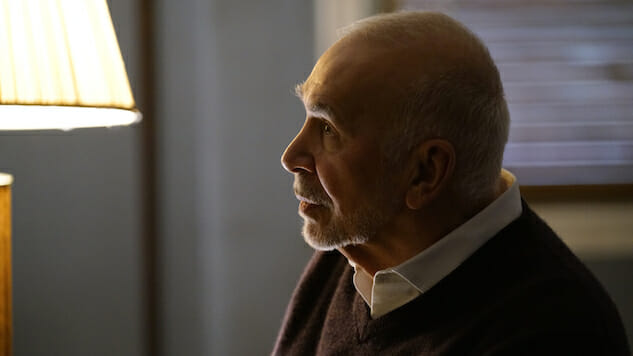The Americans: Heart Heat
(Episode 5.06)
Patrick Harbron/FX
Benjamin Stobert (Brett Tucker), of the muscular frame and earnest grin, turns out to be full of surprises—not least the persistent, playful optimism with which he scratches through Elizabeth Jennings’ (Keri Russell) hardened shell. Teaching her tai chi in his boxer shorts, as she mimics his movements in a long, white tee, the trait she first read as arrogance seems, more and more, to be the sort of idealism Elizabeth herself once possessed. As early as Season Three’s “Born Again,” in which Elizabeth wistfully describes her involvement in the civil rights movement to Paige (Holly Taylor), her sense of purpose has begun to slip, tangled up in the wanton cruelties her career requires; in tonight’s episode, “Crossbreed,” the solace she finds in the age-old Chinese movements is fleeting, buffeted by the needless death of the lab technician in “The Midges” and memories of her friendship with Young Hee. The result, as Benjamin perceives, is a reservoir of inner turmoil that even Elizabeth’s steely exterior can’t hide, and his diagnosis, “heart heat,” is the season’s primary motor: It’s the pinched feeling, the tamped-down terror, that feeds the beast of doubt.
Though the The Americans has, of late, turned its focus away from religious faith—it crops up in “Crossbreed” as Paige, reading Marx, works through the disconnect between Capital’s criticism of religion and the positive feelings that suffused her baptism—the series treats other systems of belief in similar fashion. Communism, capitalism, democracy, psychology, EST: Each functions, in its own way, as a set of principles the characters test against the facts of their daily lives, and each fails, in the long run, to temper the heart, for there is no single solution to the problem of meaning that The Americans continues to face. Philip (Matthew Rhys), long suspected of dangerous political sympathies by his KGB handlers, wonders at the riches he’s found in enemy territory (“We didn’t have anything, and now we have everything”), and glosses his commitment to the USSR as if it were a 9-to-5; Elizabeth, never one for quick fixes, finds unexpected calm in tai chi and talk therapy, before returning to the notion that, under Soviet communism, everyone is “in it together.” But in searching for forms of faith to soothe their “heart heat,” to heal their trauma, Philip, Elizabeth and Paige don’t act as adherents to one or another catechism. Rather, they choose what seems to work and dispense with the rest: On the ground, no ideology operates as proffered on paper, subject to the constant reinterpretation and hybridization to which the title of “Crossbreed” refers.
-

-

-

-

- Curated Home Page Articles By Test Admin October 21, 2025 | 3:10pm
-

- Curated Home Page Articles By Test Admin October 21, 2025 | 2:57pm
- Urls By Test Admin October 21, 2025 | 2:57pm
- Curated Home Page Articles By Test Admin October 21, 2025 | 2:55pm
-

-

-

-

-

-

-

-

-

-

-

-

-

-

-

-

-

-

-

-

-

-

-

-

-

-

-

-

-

-

-




































